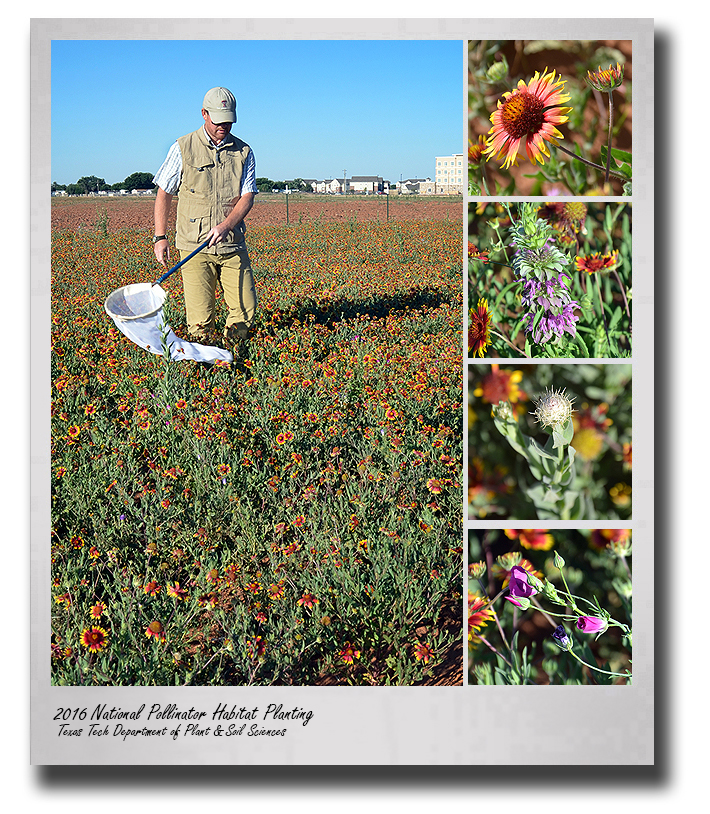GALLERY: Native bee pollinator planting springs forth at CASNR research farm
By: Norman Martin
 The first wildflowers of spring are beginning to appear in a special Texas Tech University
research site aimed at improving foraging and other habitat resources for native bees,
as well as managed honey bees. The initiative, a collaboration between the Bayer CropScience's
"Feed a Bee" program and The Wildlife Society, seeks to provide forage for pollinators,
addressing one of the biggest challenges bees face today in the United States.
The first wildflowers of spring are beginning to appear in a special Texas Tech University
research site aimed at improving foraging and other habitat resources for native bees,
as well as managed honey bees. The initiative, a collaboration between the Bayer CropScience's
"Feed a Bee" program and The Wildlife Society, seeks to provide forage for pollinators,
addressing one of the biggest challenges bees face today in the United States.
"In addition to pollinator habitat demonstrations, the plantings will provide a means to investigate how improvements in floral and habitat resources in different landscape settings influence pollinator communities, which is important considering the level of native habitat fragmentation on the South Plains," said Scott Longing, an assistant professor in Tech's Department of Plant and Soil Science. In Tech's case, the site includes a corner of Tech's College of Agricultural Sciences and Natural Resources' Quaker Research Farm at 200 N. Quaker Ave. in Lubbock.
The half-acre site, which was planted in late October, is home to more than 30 varieties of wildflowers, and lately a few invasive weeds. Longing and his students are using the wildflower field for investigations of plant growth across different irrigation regimes, wild bee and honey bee behavioral interactions, and no-kill and kill sampling methods for assessing pollinator communities.
The Bayer Bee Care Program and The Wildlife Society were drawn to the rich diversity of pollinators in the Lubbock area that could benefit from additional forage and habitat. Texas Tech faculty have been actively involved with the USDA Conservation Innovation Grants on pollinators.
"The university setting offers a unique opportunity to highlight the Feed a Bee project during future field days at the farm," said Becky Langer, a Bayer CropScience Bee Health Project Manager. "Through the national planting of native pollinator friendly plants, our goal is to further elevate and support these efforts by the various stakeholders in Lubbock as a great example of working together to promote and protect pollinator health."
In addition to CASNR's Quaker Research Farm, the other three national locations include McCarty Family Farms in Kansas, Salem4Youth in Illinois, and The Packers of Indian River in Florida. Each location reportedly has an important story to tell, and plays a role in pollinator promotion and protection, Langer said.
CONTACT: Scott Longing, Assistant Professor of Entomology, Department of Plant and Soil Sciences, Texas Tech University at (806) 834-1965 or scott.longing@ttu.edu
0511NM17 / PHOTO: CASNR's Scott Longing uses a net to collect pollinators from mass-flowering Firewheel, Gaillardia pulchella and other wildflowers at Tech's Quaker Research Farm. Among the wildflowers at the research site are (top-to-bottom) Firewheel, Lemon Balm, Basket Flower bud, and Wine Cup.
Davis College NewsCenter
-
Address
P.O. Box 42123, Lubbock, Texas 79409-2123, Dean's Office Location:Goddard Building, Room 108 -
Phone
(806)742-2808 -
Email
kris.allen@ttu.edu
